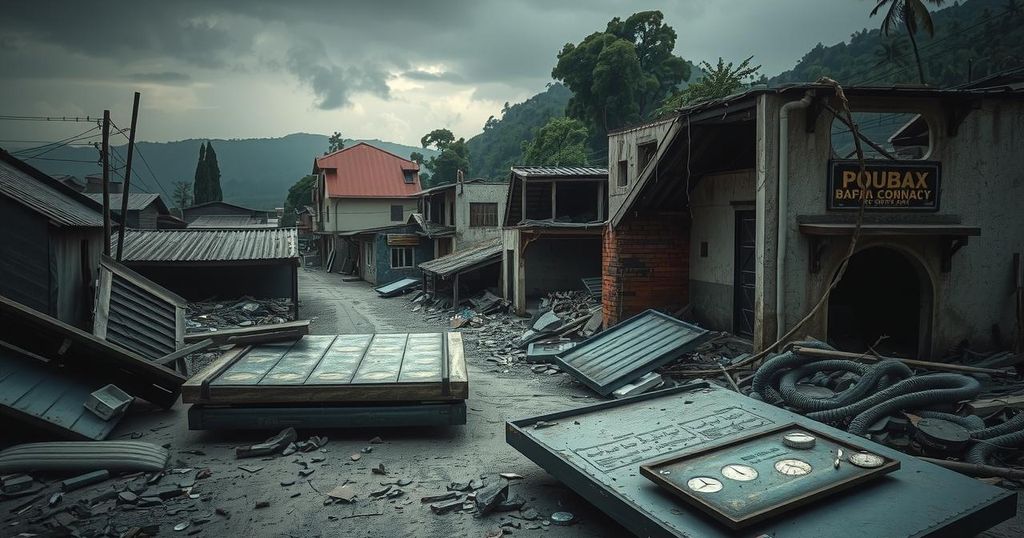Crime
AFP, ARMANDO BENEDETTI, ASIA, CALI, CARLOS FERNANDO TRIANA, CENTRAL GENERAL STAFF, COLOMBIA, CORINTO, CRIME, CUBA, ELIZABETH DICKINSON, EMC, FARC, GANG VIOLENCE, GUA, GUN VIOLENCE, INDIA, INTERNATIONAL CRISIS GROUP, LUZ AMPARO, MIGUEL URIBE, NATIONAL POLICE, NORTH AMERICA, PROTESTS, SOUTH AMERICA, VIOLENCE
Fatima Alavi
0 Comments
Seven Dead as Colombia Faces Wave of Coordinated Bombings and Gun Attacks
Colombia experienced a wave of violence on Tuesday resulting in seven deaths from coordinated bomb and gun attacks across multiple locations, particularly in Cali. The attacks are being linked to a local guerrilla group, raising fears of a return to past violent periods. Alongside the violence, an assassination attempt on Senator Miguel Uribe has increased public anxiety regarding security in the nation.
In a day marked by terror, a series of 24 coordinated bombings and gun attacks in southwestern Colombia have resulted in the deaths of at least seven individuals. The attacks, which occurred on Tuesday, targeted police stations, municipal buildings, and civilian areas, creating chaos in major cities like Cali, which is the third-largest in the country, as well as in nearby towns.
National Police chief Carlos Fernando Triana indicated that the perpetrators are likely members of a local guerrilla faction. This group employed various methods including the use of car bombs, motorcycle explosives, rifle shots, and a suspected drone to carry out their assault. Tragically, the police confirmed that amongst the deceased, there are two police officers, with at least 28 others sustaining injuries as well.
Witnesses in Cali and towns like Villa Rica, Guachinte, and Corinto described the aftermath of the violence. Scattered debris and the destroyed remnants of vehicles showed the brutality of the attacks. Many residents have started to experience a sense of dread reminiscent of the rampant violence witnessed in Colombia during the 1980s and 1990s, which included widespread cartel conflicts and political killings.
Interior Minister Armando Benedetti noted that there has been unverified information hinting at the involvement of a guerrilla group in a recent attack that targeted Senator Miguel Uribe. This series of violence follows close on the heels of a failed assassination attempt on Uribe, raising fears about the stability of the nation.
Luz Amparo, a local shop owner in Corinto, recounted the terrifying moment when a blast struck her bakery, mistaking it initially for an earthquake. She described the devastation she encountered upon inspection—her once-thriving business reduced to rubble. This kind of firsthand account emphasizes the immediate terror and destruction that the population is grappling with.
Experts suggest that the attacks could be attributed to a dissident faction of the long-dominant FARC guerrilla group. Security analyst Elizabeth Dickinson from the International Crisis Group characterized the incident as a highly organized assault that illustrates the group’s operational capabilities, particularly within urban environments such as Cali.
President Gustavo Petro’s attempts to negotiate peace with the EMC and similar armed groups have not gone as planned, with these assaults potentially showing a retaliatory strategy in response to military actions against their leadership. Dickinson inferred that the group might be escalating tensions to counteract a reported military operation targeting their prominent leader, Ivan Mordisco.
In a somewhat chilling warning statement, the EMC advised the public to steer clear of military and police facilities but refrained from formally accepting responsibility for the violence. The assaults occurred just days after a shocking assassination attempt on Senator Uribe, who was shot while campaigning in Bogota. A 15-year-old suspect has been charged in connection to that incident, raising myriad concerns about security and governance in the country.
As Colombia faces mounting fears of a resurgence in violence, these events signal a challenging road ahead for national stability and security. Public anxiety is palpable as citizens seek answers regarding the recent attacks and the ongoing threats against both officials and the broader community.
The coordinated bomb and gun attacks in Colombia have resulted in at least seven fatalities and have reignited fears of a return to historical violence characterized by guerrilla warfare and political assassinations. The suspected involvement of a local guerrilla faction, coupled with the timing following a botched assassination attempt on a senator, has heightened public scrutiny over the government’s security measures. As Colombia struggles to navigate this precarious situation, much uncertainty looms regarding its safety and stability going forward.
Original Source: globalnation.inquirer.net




Post Comment